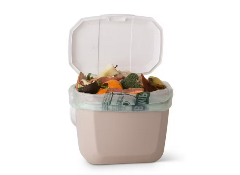Since April to the end of August, an estimated 230 tonnes of food scraps have been diverted from garbage into composting. This is an over 30% drop in the amount of garbage Summerland residents put out to the curb. Estimated net savings comparing to landfilling have been over $15,000 in five months with the potential offset of over 400 tonnes of CO2 equivalent.
A major issue comes from people placing food scraps all week into hot yard waste carts. Food scraps should be kept indoors or in a protected area until the day of collection to avoid attracting animals. Extra smelly food scraps like meat and fish can be placed in a sealed container in your freezer or fridge if you have room.
To avoid yard waste carts getting gross and sticky, food scraps should be wrapped in paper, placed in a paper bag or be placed between layers of yard waste. Compostable plastics are not allowed to be composted in British Columbia so please never use plastic bags.
As we approach winter, some property owners may want to store extra dry leaves. These can be placed at the bottom of the cart over the winter to help stop food scraps from freezing. If you store the dry leaves in a kraft paper bag, the paper bag can also be used to line the cart as you run low on leaves. Other properties should wrap their food scraps in newspaper or paper bags to avoid freezing issues.
Key contaminants in the compost:
- Containers for food waste. The program can’t take cups or other containers.
- Plastic bags. Plastics, including compostable plastics, cannot be composted.
Lumber and Treated Wood. These materials should not be hidden in yard waste and need to be disposed of at the landfill correctly.
